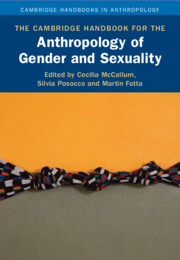Book contents
- The Cambridge Handbook for the Anthropology of Gender and Sexuality
- Cambridge Handbooks in Anthropology
- The Cambridge Handbook for the Anthropology of Gender and Sexuality
- Copyright page
- Contents
- Contributors
- 1 Introduction to The Cambridge Handbook for the Anthropology of Gender and Sexuality
- Part One Openings and Orientations
- Part Two Knowledges and Domains
- Part Three Resistances and Intersections
- Part Four Desires and Relations
- Part Five Recursivities and Futures
- 22 Ontological Sex-Genders
- 23 Futures
- Name Index
- Subject Index
- References
23 - Futures
from Part Five - Recursivities and Futures
Published online by Cambridge University Press: 29 September 2023
- The Cambridge Handbook for the Anthropology of Gender and Sexuality
- Cambridge Handbooks in Anthropology
- The Cambridge Handbook for the Anthropology of Gender and Sexuality
- Copyright page
- Contents
- Contributors
- 1 Introduction to The Cambridge Handbook for the Anthropology of Gender and Sexuality
- Part One Openings and Orientations
- Part Two Knowledges and Domains
- Part Three Resistances and Intersections
- Part Four Desires and Relations
- Part Five Recursivities and Futures
- 22 Ontological Sex-Genders
- 23 Futures
- Name Index
- Subject Index
- References
Summary
This chapter explores future orientations for gender and sexuality in anthropology. After a brief incursion into anthropological engagements with future-making, modernity, and the straightness of settler time, the chapter turns to queer and feminist science and technology studies work on the projection of anthropocentric understanding of gender and sexuality onto natural worlds. Despite the exuberance of nonhuman sexualities, sexual reproduction is still seen as the apex of evolution and the social sciences still struggle to fully think gender and sexuality outside (biological) reproduction. The chapter then turns to a discussion of Haraway’s and Clarke’s call for a multispecies reproductive justice that takes on the vexed question of overpopulation. This call, while important in its quest to free kinship from chrono-hetero-normative reproductive imperatives, leverages apocalyptic futurisms and overlooks the myriad ways Indigenous and Black communities have long been in relation with human and more-than-human kin. It concludes with reflections on the importance of resisting grand explicative gestures characteristic of patriarchal logics and technological solutions, positing livable future as the capacity to thrive and regenerate through the heinous violence that continues to mark the world. It invites anthropologists to ponder what futures the work they do perpetuate or make possible.
Keywords
- Type
- Chapter
- Information
- Publisher: Cambridge University PressPrint publication year: 2023

